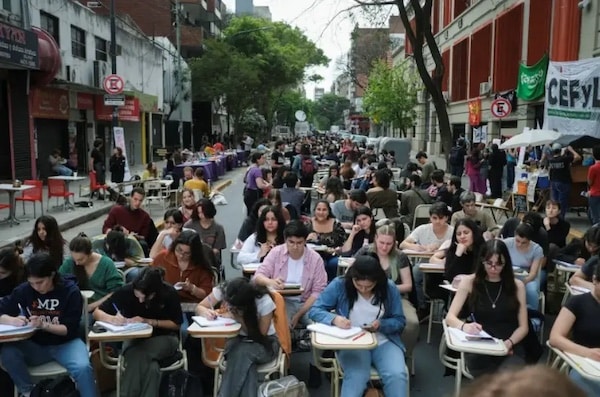Students are occupying more than 70 different faculties of 30 public universities across Argentina. At least twelve faculties in Buenos Aires, the capital, are tomada (taken). The occupations stretch into remote areas in the far north and south of the country.
The events mark a new stage in an ongoing fight against far-right President Javier Milei, elected last year promising mass privatizations and budget cuts to pay down government debt owed to the International Monetary Fund, while funnelling money to the rich through tax cuts.
At the beginning of the year, Milei took a chainsaw to public university spending, cutting funding by 71 percent. This provoked mass protests involving 500,000 students in Buenos Aires and large numbers in the rest of the country.
Last month, politicians voted to increase university workers’ salaries, the purchasing power of which has been undermined by rampant inflation—consumer prices have increased by more than 200 percent in twelve months.
When Milei threatened to veto the bill, more than 1 million people marched to fight for its passage. But in early October, the president confirmed he would block it. That sparked a wave of protests and occupations by students across the country.
Carlos Barros, a student activist at the University of Buenos Aires and a member of the Socialist Workers’ Movement, spoke to Red Flag’s Jasmine Duff about how things look on the ground.
——————————
Jasmine Duff: Why are students occupying?
Carlos Barros: Students decided to occupy universities because of the ongoing defunding of public education, which has been taking place for several years by all governments but has reached a new level with Milei’s administration. Universities don’t have sufficient funding to increase the salaries of professors and university staff (which are far behind inflation), or to improve the conditions of the buildings used by students. It could result in the eventual cutting of jobs and closure of universities altogether.
The occupations started when Milei vetoed a bill to increase the funding for universities. The Congress approved the veto with the complicity of representatives from the Radical Civic Union [a liberal political party] and even some of the Peronists [the main political current in the country, dating from the rule of Juan Perón immediately after World War Two].
This enraged students all over the country and led to the calling of assemblies at universities. The first were at the faculty of Philosophy and Letters and the faculty of Psychology of the University of Buenos Aires, where hundreds of the students voted to occupy the faculties. In the following days, the occupations spread to other faculties and to universities in the rest of the country. We are witnessing the rise of a new Argentinean student movement, which many have said has been in decline for years.
JD: Videos circulating online show students taking mass votes, holding debates inside their faculties, and setting up desks on public roads to hold teach-ins. What’s it like inside a faculty occupation?
CB: Basically, an occupation means that students take control over the university. We undertake all of the tasks of the administration of the university, including cleaning, organising lessons, providing food, security, etc. For each task, there are different commissions that students can join and participate in.
Regarding security, there are always students at the door to stop the dean and other members of the faculty administration from entering the building. The staff of the faculty are only allowed to enter to clock on, but they cannot perform their usual tasks, since they are being performed by the students. Professors cannot hold lessons inside the building, save for a few exceptions.
Every day, a soup kitchen provides food for the students at the occupation and people who may need it in the neighbourhood. The soup kitchen is supported through donations. Every night, we do activities to entertain ourselves and strengthen our sense of community. There are film screenings, live music, karaoke, games and obviously lots of political discussion. We’re having a great time. We sleep inside classrooms with sleeping bags or mattresses. It is kind of like camping.
All lessons that students would normally have inside the faculty building are taken outside to the street. Students bring seats and blackboards outside and block the street. We want to continue studying while also protesting and bringing more visibility to this conflict. All lessons must be held outside, save for the cases where specific elements of a classroom are needed or for exams.
JD: Socialist organisations are prominent in the struggle, but many student unions are run by political tendencies and parties that are part of Milei’s government. What role have these student leaders played in the movement, and what debates are taking place?
CB: We are having many debates with the bureaucratic student union leaders and the grassroots of the students movement about how to advance the struggle for our right to public education. Most student unions are led by Peronists or Radicals. They are political forces of the capitalist regime. As such they try to avoid losing control over the student movement and demobilise it while posing as critical of Milei.
They call for few or no assemblies at all in some cases, decide things without consulting the students or, worse, negotiate with the university authorities behind the students’ backs.
The Socialist Workers’ Movement and the left are doing our best to radicalise the student movement, and to bring more independent students to participate in their respective assemblies so they can overcome the bureaucracies.
We are also campaigning for inter-faculty and inter-university assemblies. And we are coordinating actions with the rest of the working-class sectors so we can all agree on a unified plan of struggle to stop this attack by the government.

